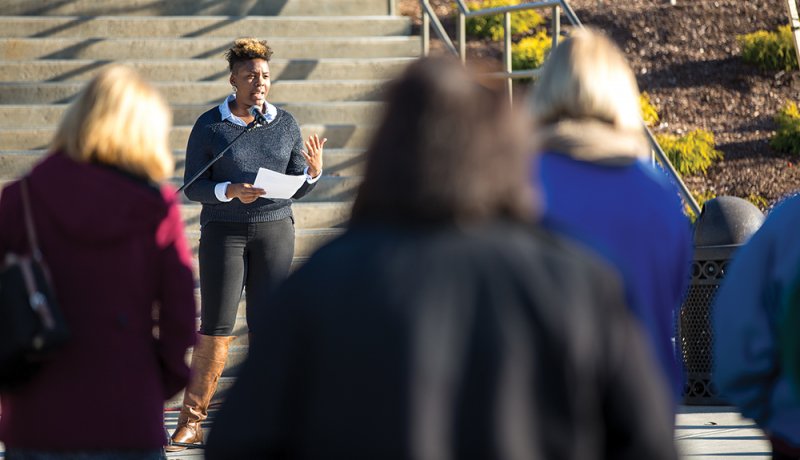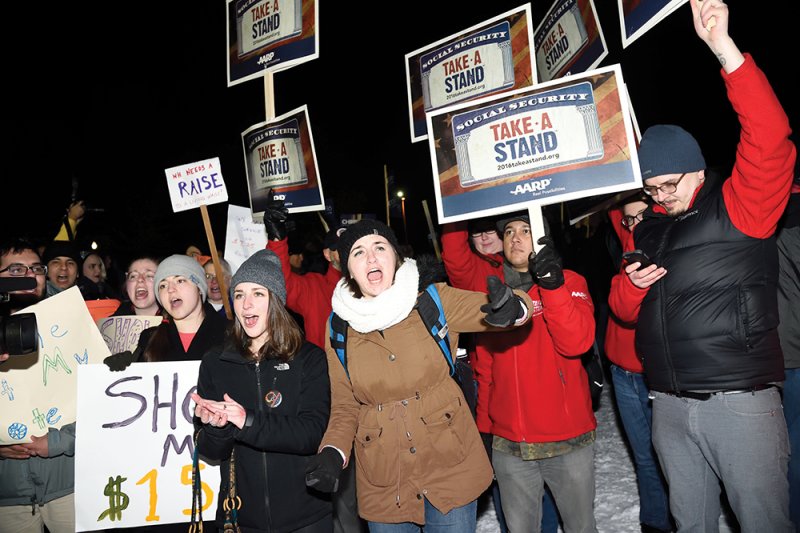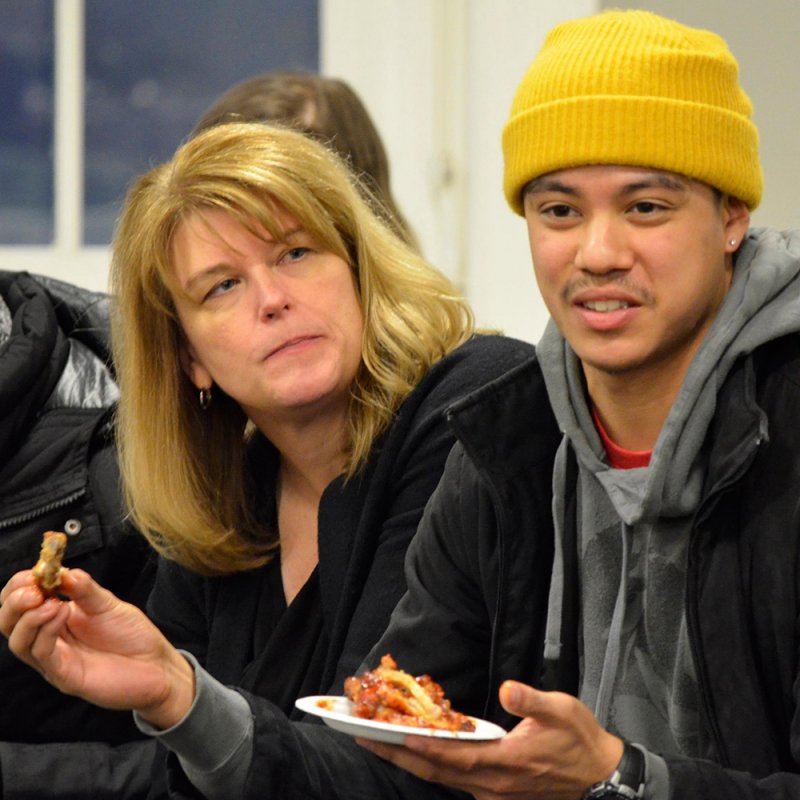
Students, faculty and staff gather for Unity Day at the University of NH in Durham. Courtesy of UNH.
When people began arriving at the University of NH (UNH) to hear controversial talk show host and political commentator Dave Rubin speak this spring, they were met by students who attempted to block them from entering the arena and then tried to disrupt Rubin’s talk. A year earlier, in Middlebury, Vt., college students shouted down Libertarian political scientist and author Charles Murray as he struggled to deliver a speech, forcing him to move to a private room where his talk was live-streamed. And throughout 2017, clashes near the University of California at Berkeley between anti-Trump activists and right-wing demonstrators turned violent, and a planned speech by conservative commentator Ann Coulter was cancelled twice.
With more such incidents making headlines, NH colleges and universities are joining campuses across the country in asking difficult questions: How can they balance freedom of speech with the right to dissent? When does political correctness go too far? How can they produce graduates capable of critical thought in an era of student resistance to hearing ideas contrary to their own?
Meagan Sage, assistant dean of students at Southern NH University (SNHU), says it was such considerations that led to the creation of new policies at that institution. “We were seeing a lot of situations across the country where they were having a lot of protests, sometimes with violence, and we wanted to get ahead of that,” she says. “A committee came together about this time last year to set up policies so students could protest and share their opinions as safely as possible.”

A student speaks at Southern NH University's Diversity Day in November 2015. The event was held to discuss and celebrate diversity in the community. Courtesy of SNHU.
The policies lay out how the roughly 4,000 undergraduate and graduate students on campus may organize a demonstration or bring a speaker to campus, following a safety protocol that involves checking with the campus safety office to see if security is needed. “It’s a fine line to balance free speech and allow students to express their feelings and thoughts while also ensuring safety,” Sage says.
UNH Addresses Struggles
UNH’s Durham campus, with more than 15,000 on-campus students, by far the largest number of any college or university in the state, has faced challenging situations. In addition to the Rubin talk, which finally proceeded despite the protests, the campus community has faced criticism for student celebrations of the Mexican holiday Cinco de Mayo. White students wearing sombreros and serapes during the festival led to accusations of cultural appropriation and insensitivity. That led college officials—working with students, staff, faculty and town leaders—to initiate a new campus tradition, Unity Day, to be held annually on the last Saturday before classes end in the spring. This year, the inaugural celebration fell on Cinco de Mayo, and included a football game, benefit run, cookout and service activities.
The school also found itself in the headlines three years ago when its website briefly included a “Bias-Free Language Guide” that many challenged as over the top for political correctness. It recommended against using words like “American” for U.S. citizens only and suggested phrases like “people of size” rather than “obese” and “person of material wealth” rather than “rich.”
Created by a group of faculty, students and staff connected to the school’s diversity office, the guide was never university policy and drew criticism even from outgoing UNH President Mark Huddleston. Charles Putnam, UNH special counsel, says the website posting got more attention than it deserved.
“Yes, there was a moment in time when some guidelines were posted on the website, but it would be a mistake for commentators not to note we have had official policies guaranteeing free speech,” he says. “The people I work with closely on these issues really do care about the ability of students and staff to study and work in an environment where free speech is honored in letter and in spirit.” That work is ongoing, Putnam says. After the incident with the Rubin talk, “we hope to continue to work with students, faculty and others to look at how we can improve our capacity to hold events that may be challenging or have potential to create disruption,” he says.
Catching FIRE
Putnam has also worked with officials from the Foundation for Individual Rights in Education (FIRE), a watchdog group that has ranked 450 American colleges on commitment to free speech and that recently raised UNH’s ranking from “yellow” to “green,” its highest. The change came after minor revisions were made to five UNH policies involving such things as demonstrations and posting regulations, a civility code, residence hall policy and a bias incident protocol.
Plymouth State University also gets a green-light ranking from FIRE, and Keene State College is close to doing so, according to Laura Beltz, FIRE’s senior program officer for policy reform. FIRE recommends tactics like counter-demonstrations, rather than shout-downs or speaker “disinvitations,” as a means of expressing dissent.

A Plymouth State University student speaks during a demonstration honoring the victims of the Parkland, Fl. shooting, and calling on Congress to take action. Photo by Clayton Harbert.
Jeff Maher, director of campus safety and compliance at Keene State, says the school regularly updates all its policies “as the legal landscape changes, depending on case law and new federal guidance enacted or withdrawn.”
He says FIRE expressed concerns about some language in Keene State’s discrimination and discriminatory harassment policy as being too broad. Some changes were made to that policy.
Maher says Keene State has policies that speak to student rights to protest or exercise free speech and a number of other policies—such as those regarding sexual harassment and discrimination—that have language that address speech. They also include the statement that “the protections of the First Amendment must be carefully considered in all complaints involving speech or expressive conduct.”
Beltz says FIRE maintains two databases, including one of “disinvitation attempts” of speakers at American colleges, and one that includes overall school rankings. Four of NH’s roughly two dozen colleges and universities have been ranked, and Beltz says more will be evaluated.
The fourth NH school ranked by FIRE is Dartmouth College, which Beltz says was given a red-light grade because of its “acceptable use of technology” policy that bans content that is offensive or hateful.
“When you see broad [language], that gets an automatic red light,” she says. A Dartmouth spokesperson declined comment on the FIRE ranking.
A Lack of Civil Discourse
Some see the current tension between free speech and dissent as part of a broader breakdown of civil discourse in the country.
Neil Levesque is chief of staff at St. Anselm College in Goffstown and director of its NH Institute of Politics, known for hosting a variety of speakers from presidential candidates to international guests. He also worked for 12 years for former NH Republican Congressman Charlie Bass.
“In my experience in politics, years ago, a member of Congress would go out and do town hall meetings back home,” he says. “It was a great way to take Washington out of them, if you will. A farmer would come up and say he was concerned about milk prices. You can’t do those anymore. It is now acceptable in society that people scream and yell and disrupt political events. I think it’s definitely a bad trend.”

Protestors at the ABC News Democratic and Republican primary debates held at Saint Anselm College on Feb. 5, 2016. Courtesy of Saint Anselm College.
Robin Burroughs Davis, vice president for student development and dean of students at Colby-Sawyer College in New London, says that school has not seen any disruptive dissent, even at potentially controversial programs. “In the past year, we saw an increase in the number of campus events designed to foster different points of view,” she says. “Hot Topics and Hot Wings, for example, was a series of student-led discussions about race, sexuality, immigration and other issues. A new student organization is committed to fostering spaces where students can discuss important topics. Their first event focused on players kneeling at NFL games and the robust conversation allowed multiple and differing points of view.”

A "Hot Topics and Hot Wings" event at Colby-Sawyer College. Courtesy photo.
Many point out that protests on campus predate the current climate and to some extent are part of the general education of young people on the verge of entering adult life. “The speech issue is as old as our democracy, and students have been protesting in one way or another as long as colleges and universities have been around,” says Maher at Keene State. “Even though there’s this perception that there’s a chilling of free speech, I still see robust debate and real value in the free exchange of ideas.”
Most agree that disruption attempts on NH campuses are rare compared to those in some other states. FIRE’s website lists 379 incidents of campus speaker “disinvitations” or “attempted disinvitations” between 2000 and 2018 in the country, and only one—the Rubin talk—occurred in the Granite State.
“We recognize in New Hampshire that there’s a value to open debate. That’s part of our culture here, whether at Town Meeting or in our classrooms or in other public forums,” says Maher. “New Hampshire recognizes that ideas can clash, ideas can be argued, but we don’t necessarily take that to mean that people should clash.”

 Current Issue - April 2024
Current Issue - April 2024